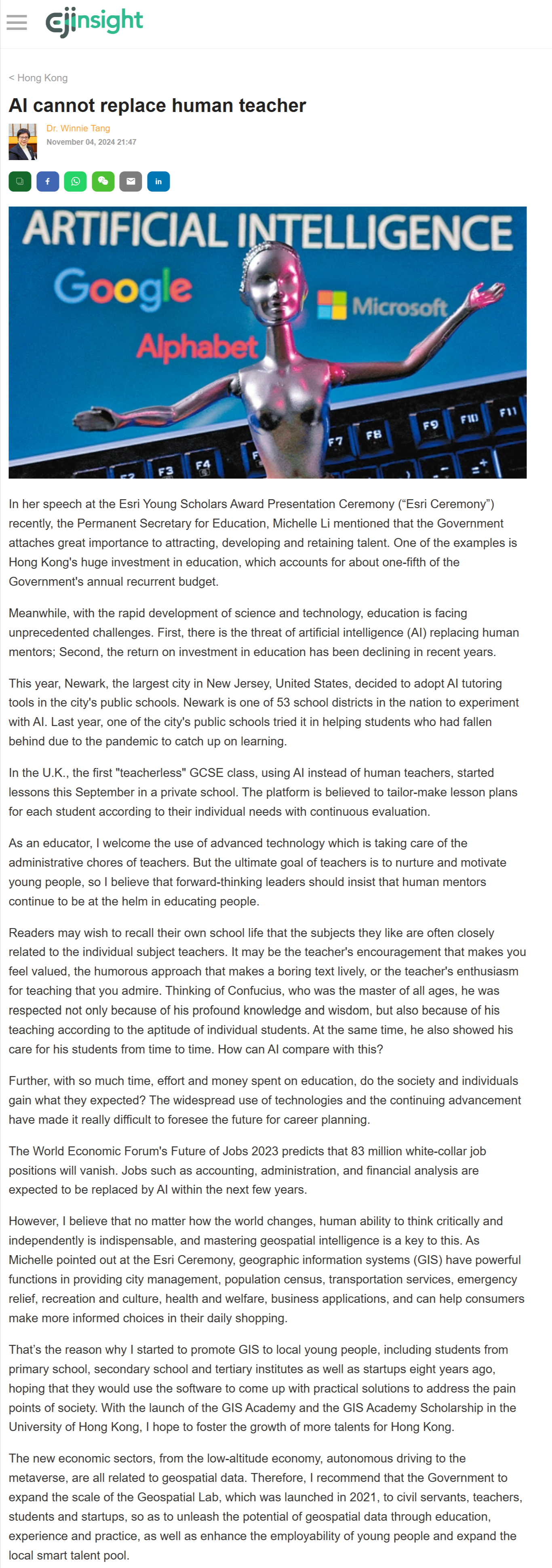網上版請按此

AI cannot replace human teacher
In her speech at the Esri Young Scholars Award Presentation Ceremony ("Esri Ceremony") recently, the Permanent Secretary for Education, Michelle Li mentioned that the Government attaches great importance to attracting, developing and retaining talent. One of the examples is Hong Kong's huge investment in education, which accounts for about one-fifth of the Government's annual recurrent budget.
Meanwhile, with the rapid development of science and technology, education is facing unprecedented challenges. First, there is the threat of artificial intelligence (AI) replacing human mentors; Second, the return on investment in education has been declining in recent years.
This year, Newark, the largest city in New Jersey, United States, decided to adopt AI tutoring tools in the city's public schools. Newark is one of 53 school districts in the nation to experiment with AI. Last year, one of the city's public schools tried it in helping students who had fallen behind due to the pandemic to catch up on learning.
In the U.K., the first "teacherless" GCSE class, using AI instead of human teachers, started lessons this September in a private school. The platform is believed to tailor-make lesson plans for each student according to their individual needs with continuous evaluation.
As an educator, I welcome the use of advanced technology which is taking care of the administrative chores of teachers. But the ultimate goal of teachers is to nurture and motivate young people, so I believe that forward-thinking leaders should insist that human mentors continue to be at the helm in educating people.
Readers may wish to recall their own school life that the subjects they like are often closely related to the individual subject teachers. It may be the teacher's encouragement that makes you feel valued, the humorous approach that makes a boring text lively, or the teacher's enthusiasm for teaching that you admire. Thinking of Confucius, who was the master of all ages, he was respected not only because of his profound knowledge and wisdom, but also because of his teaching according to the aptitude of individual students. At the same time, he also showed his care for his students from time to time. How can AI compare with this?
Further, with so much time, effort and money spent on education, do the society and individuals gain what they expected? The widespread use of technologies and the continuing advancement have made it really difficult to foresee the future for career planning.
The World Economic Forum's Future of Jobs 2023 predicts that 83 million white-collar job positions will vanish. Jobs such as accounting, administration, and financial analysis are expected to be replaced by AI within the next few years.
However, I believe that no matter how the world changes, human ability to think critically and independently is indispensable, and mastering geospatial intelligence is a key to this. As Michelle pointed out at the Esri Ceremony, geographic information systems (GIS) have powerful functions in providing city management, population census, transportation services, emergency relief, recreation and culture, health and welfare, business applications, and can help consumers make more informed choices in their daily shopping.
That's the reason why I started to promote GIS to local young people, including students from primary school, secondary school and tertiary institutes as well as startups eight years ago, hoping that they would use the software to come up with practical solutions to address the pain points of society. With the launch of the GIS Academy and the GIS Academy Scholarship in the University of Hong Kong, I hope to foster the growth of more talents for Hong Kong.
The new economic sectors, from the low-altitude economy, autonomous driving to the metaverse, are all related to geospatial data. Therefore, I recommend that the Government to expand the scale of the Geospatial Lab, which was launched in 2021, to civil servants, teachers, students and startups, so as to unleash the potential of geospatial data through education, experience and practice, as well as enhance the employability of young people and expand the local smart talent pool.
Dr. Winnie Tang
Adjunct Professor, School of Computing and Data Science; Department of Geography, Faculty of Social Sciences, The University of Hong Kong